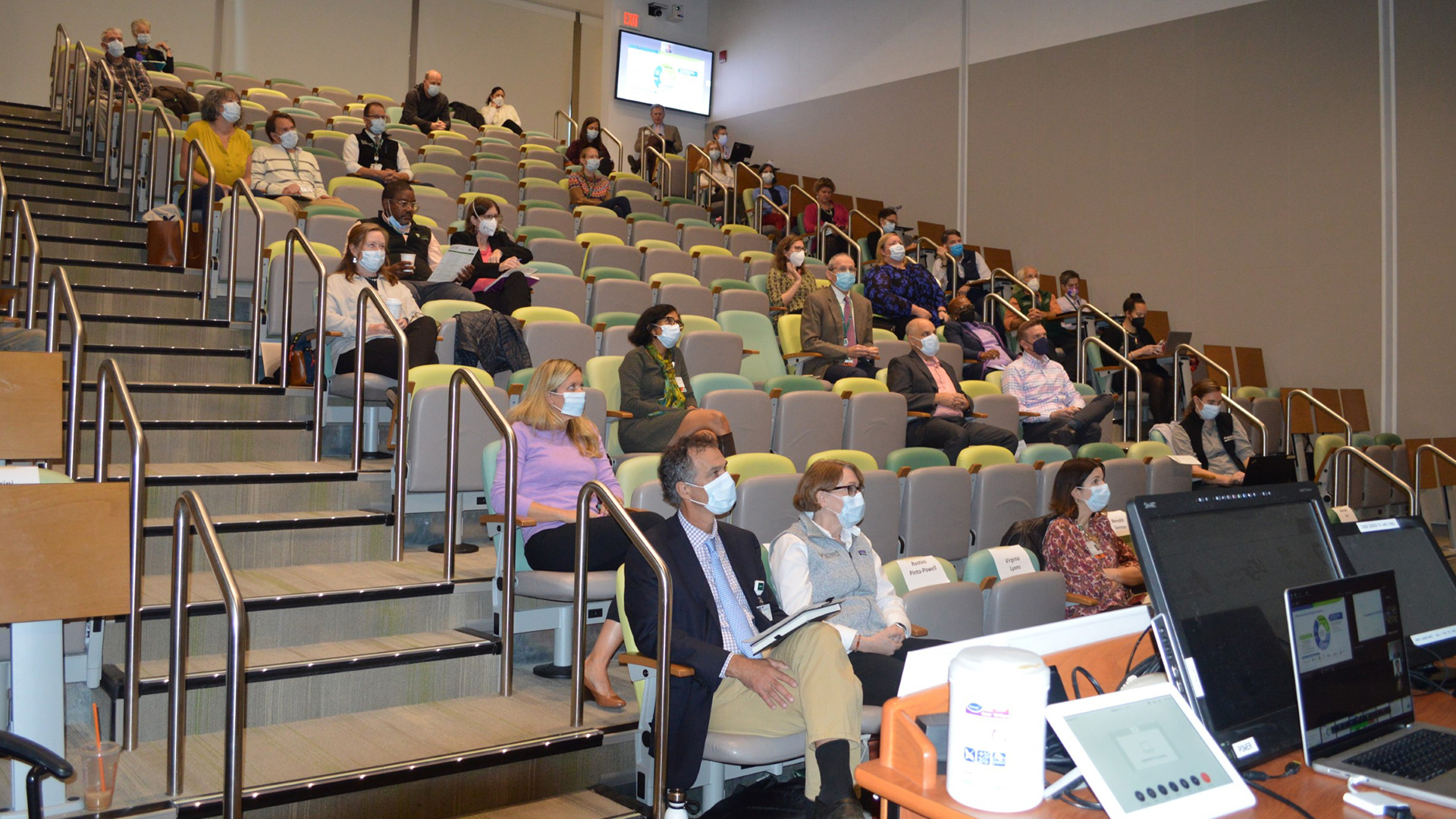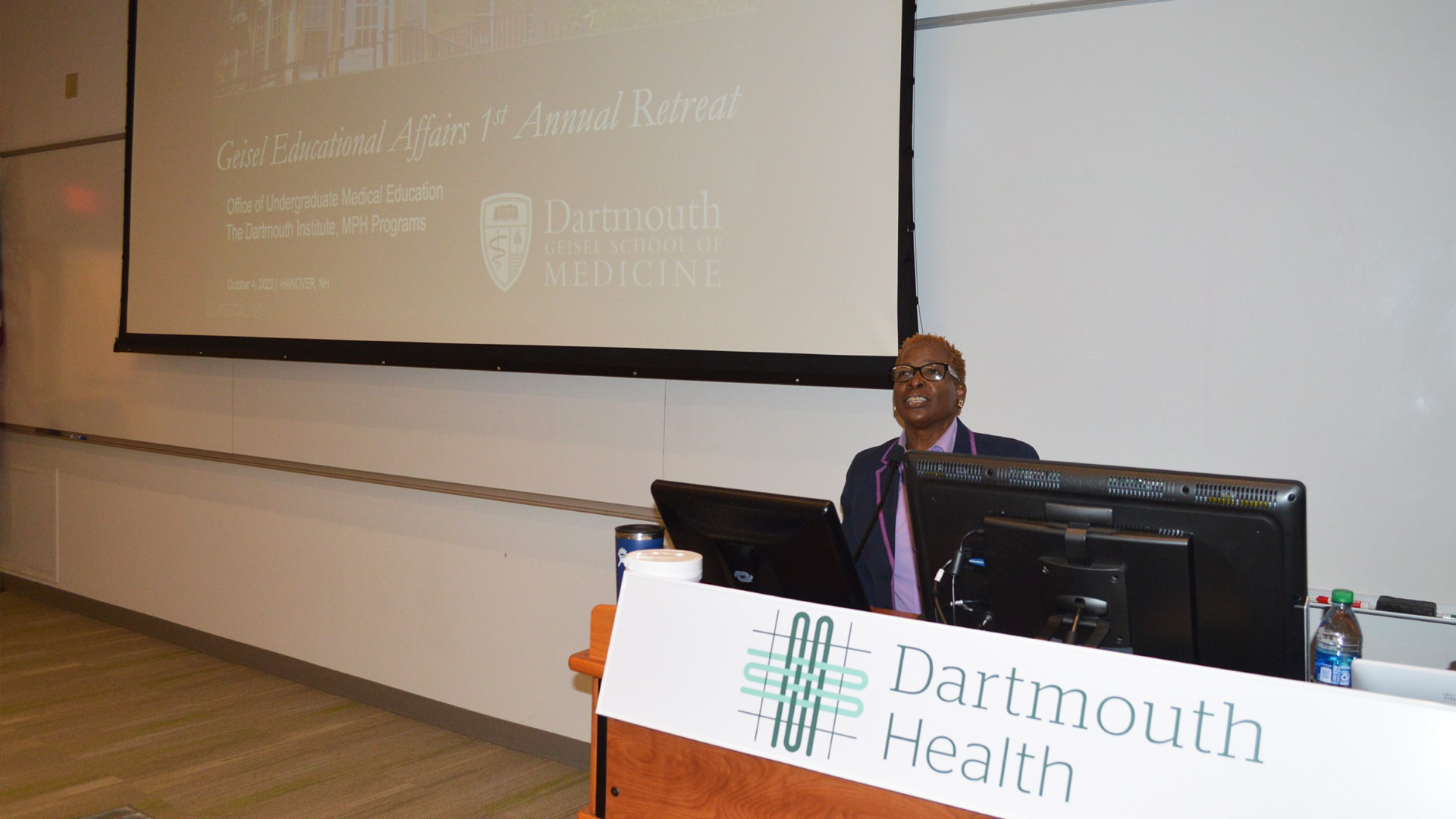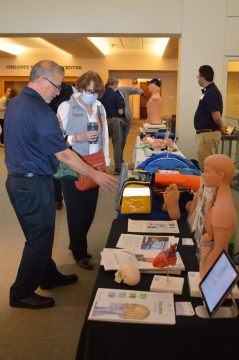
Geisel School of Medicine’s inaugural educational affairs retreat bought together medical and public health faculty, student leaders, and staff for a day of working toward the common goal of helping Geisel’s diverse community of health professions learners and educators flourish on their individual journeys.
“The MPH and MD program leadership teams recognized this tremendous opportunity, to bring together these outstanding educational programs to discuss curricular and co-curricular experiences that aim to advance health equity in the U.S.,” says Sonia Nagy Chimienti, MD, FIDSA, senior associate dean for medical education. “Exploring and creating ways in which we can collaborate across our programs was a key goal for this inaugural retreat.”
Seeking to build community amongst educators in the wake of distance imposed by the COVID-19 pandemic, the retreat’s theme of flourishing in teaching and learning, focused on key areas of humanism in the health professions, allyship and anti-bias training, overcoming obstacles to learning and professional growth, and a faculty development session on active learning in medical education.
Nan Cochran, MD, an associate professor of medicine, and Alison Kapadia, MD, an assistant professor of emergency medicine, led allyship and anti-bias training for staff and faculty. This training program was developed through a donor supported medical education innovation fund intended to design, manage, and evaluate pedagogical enhancements in the Geisel undergraduate medical education curriculum to address bias in healthcare training environments. Geisel student leaders contributed to the content of this training through sharing their perspectives and insights with participants.
Lisa McBride, PhD, associate dean for diversity, equity, and inclusion, brought attendees up to date on the Race and Health Equity (RHE) curriculum and shared a proposal, together with Chimienti, for the development of a new advisory group for an inclusive curriculum.
“As future physicians and public health practitioners” she began, “it is critical to understand how race, racism, the geography of where we live, the nutrition we can access, and many sociodemographic determinants impact the health and well-being of people. Knowledge and action are how we make a difference. This is our responsibility as healers and as leaders.”

Committed to promoting a culture of inclusion and respect for both learners and faculty in an increasingly complex and demanding medical education environment, the proposed RHE advisory group would be tasked with supporting faculty in the development and delivery of an inclusive curriculum within the MD and MPH learning environments. With an anticipated launch for the 2023 – 2024 academic year, the advisory group would provide an institutional approach and commitment to supporting faculty in delivering a curriculum that is comprehensive, respectful, engaging, and inclusive. The proposed resources and modules would be available online, providing flexibility for educators as they promote and encourage respectful dialogue, engagement, feedback, and growth.
Kimara Ellefson, MBA, national director of strategy and partnerships at the Kern National Network (KNN) for Character & Caring in Medicine, of which Geisel is among its founding members, talked about the path toward flourishing in medicine in her morning address. Dartmouth President-elect Sian Beilock, PhD, began the afternoon session with a research presentation highlighting her team’s work on performing your best under pressure. A question-and-answer session followed each of these keynote presentations.
Ellefson reviewed KNNs collaborations across medical schools to advance culture and systems change by integrating caring and character to transform learning environments.
 Quoting Tyler VanderWheele, PhD, director the of the Human Flourishing Program at Harvard University’s Institute for Quantitative Social Science, Ellefson said, “The concept of flourishing has the potential to capture health more broadly than existing wellness measures for both patients and populations. Asking questions related to flourishing can inform and refine many complex trade-offs for patients facing treatment decisions. The concept can potentially guide clinicians in assessing their own personal well-being as well as delivering better patient-centered care.”
Quoting Tyler VanderWheele, PhD, director the of the Human Flourishing Program at Harvard University’s Institute for Quantitative Social Science, Ellefson said, “The concept of flourishing has the potential to capture health more broadly than existing wellness measures for both patients and populations. Asking questions related to flourishing can inform and refine many complex trade-offs for patients facing treatment decisions. The concept can potentially guide clinicians in assessing their own personal well-being as well as delivering better patient-centered care.”
She then described the KNN building blocks to making character understandable and measurable, leading to practical wisdom that she described as “integrative and developed through experience and critical reflection that enables people to act with good sense.”
Beilock, a cognitive scientist who studies how performance anxiety can be exacerbated or alleviated, summarized her research, and shared simple strategies to alleviate anxiety.
She noted that being anxious, or uncomfortable, “is part of the learning process and not a sign of failure.” Nor is it reflective of low knowledge. Though performance anxiety is real and not to be dismissed, Beilock said we do have the ability to control it. Research shows that when we refocus our anxiety by viewing our discomfort as a signal of personal development, that change of focus leads to diminished performance anxiety enabling us to be engaged with the task at hand.
Beilock also described the value in creating brave spaces, rather than safe spaces, that allow people to confront their discomfort by giving everyone the latitude to speak their mind, make mistakes, and to push against each other in an environment that encourages learning and success.
“Dr. Beilock’s keynote presentation highlights an important message that our Geisel leadership teams wish to emphasize—obstacles and challenges are part of life, and navigating those obstacles successfully builds leaders, strengthens programs, and ultimately helps us to move forward as our best selves,” Chimienti says.
Craig R. Westling, DrPh, executive director for educational programs at the Dartmouth Institute for Health Policy and Clinical Practice, who provided a comprehensive overview of the MPH program along with successes and challenges moving forward, says, “This retreat was the first time we’ve gathered the MD and MPH teams under the Geisel Education Affairs umbrella—which sends a signal that our education programs are growing closer together as we share more resources to better support our students.
“The content was fascinating and helpful, from recognizing shared successes to talking about current and future challenges and learning more about effective teaching and assessment methods. Overall, this is the beginning of an exciting new era for Geisel education.”